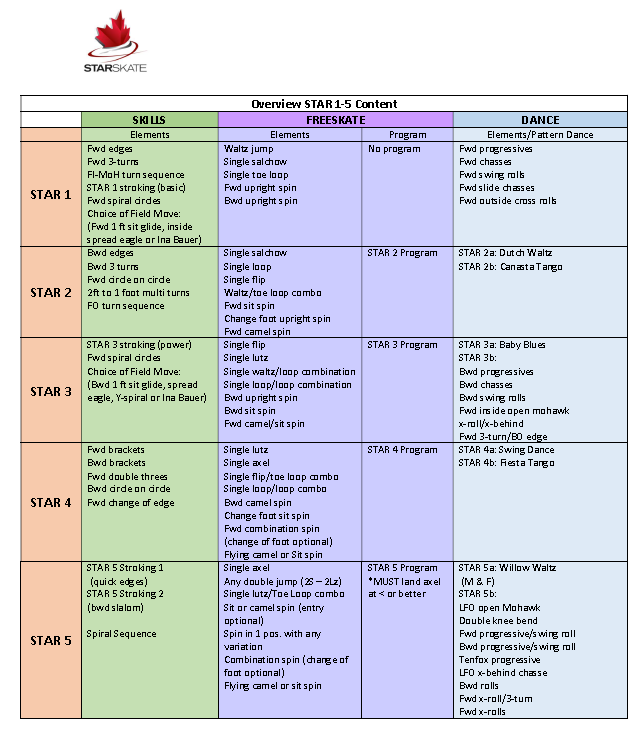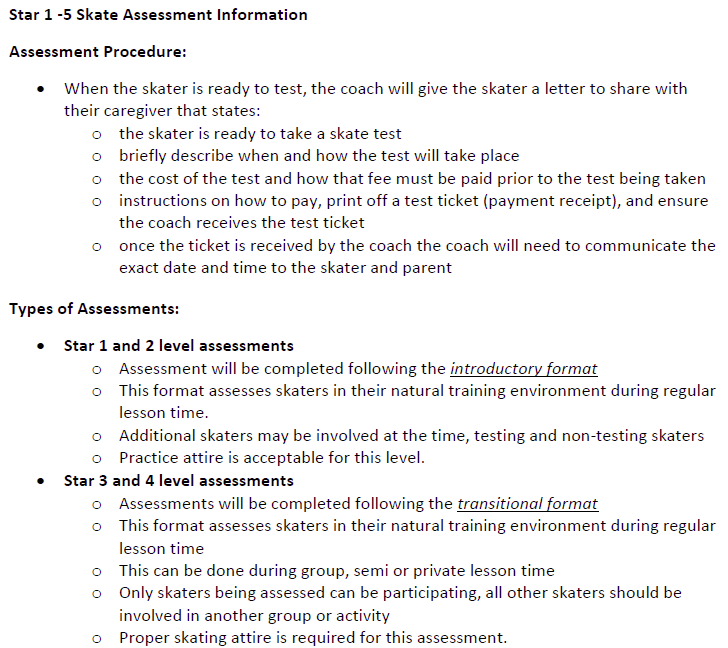
STAR 1-5 Assessment Requirements


Nutrition Information
Winter is the start of many test and competition days for skaters. You’ve already chosen your fantastic dress, you’re working on individualizing it with crystals and now it’s time to put away the Halloween candy and think about "feeding the engine" to give you the most energy for maximum performance. Skaters need to carefully plan pre-test or competition eating so that they have the energy they need and are not distracted by hunger.
When To Eat:
Exercising on a full stomach is not the ideal. Food that remains in your stomach during an event may cause stomach upset, nausea, and cramping. To make sure you have enough energy, you should allow a meal to fully digest before the start of the event. This generally takes 1 to 4 hours, depending upon what and how much you've eaten. Everyone is a bit different, and you should experiment prior to workouts to determine what works best for you.You should try to eat or drink something easily digestible about 20-30 minutes before the event. The closer you are to the time of your event the less you should eat. You can have a liquid meal closer to your event instead of a solid meal because your stomach digests liquids faster.Suggested Pre-Competition Foods:
1 hour or less before competition:
orange, tomato, or V-8 juices, fresh fruit such as apples, watermelon, peaches, grapes, or oranges and/or up to 1 ½ cups of a sports drink, such as Gatorade.
2 to 3 hours before competition:
fresh fruit, fruit or vegetable juices, bread/bagels, low-fat yogurt or a sports drink.
3 to 4 hours before competition:
fresh fruit, fruit or vegetable juices, bread, bagels, pasta with tomato sauce, baked potatoes, energy bar, cereal with low-fat milk, low-fat yogurt, toast/bread with limited peanut butter, lean meat, or low-fat cheese, 30 oz of a sports drink. Foods to avoid before exercising, because they are very difficult and slow to digest: fast foods, hot dogs, doughnuts, nachos, potato chips and candy bars high in fat (all the foods easily accessible at the Snack Bar!).Some athletes consume a quick sugar fix prior to an event in hopes of getting quick energy. Unfortunately, eating sugary foods won’t provide it! Most of the energy consumed in exercise comes from foods eaten several hours to several days prior to an event. Cold weather athletes also need to drink more water to avoid dehydration. When you are in a cold environment, your body works harder to warm and humidify the cold air that you breath in, so you lose significant amounts of water. The body’s thirst mechanism is also suppressed in colder environments, so you don’t have the desire to replace the fluids you are losing. Dehydration is one of the main reasons for reduced performance in the cold.
Recommendations:
- Eat a variety of high carbohydrate foods,
- Drink plenty of water,
- Plan to eat a small snack every 30-45 minutes (100-200 calories),
- Eat warm or hot food when possible,
- Decrease caffeine ( because it will dehydrate you),
- Don't drink alcohol because it dilates the blood vessels and increases heat loss and
- Relax and have fun!

